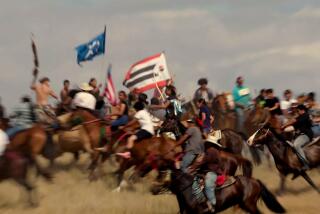Drawn to document his struggle
- Share via
NEW YORK — It is tempting to form an opinion about director of photography Ellen Kuras by the company she keeps. Martin Scorsese has employed her on a couple of films (including his Rolling Stones documentary, “Shine a Light”), she’s been a regular hire for directors Spike Lee and Michel Gondry for years, and she recently shot Sam Mendes’ upcoming film “Away We Go.”
And yet, it’s not the famous directors who have enlisted her visual filmmaking skills who best help explain Kuras -- for that, perhaps, it’s best to look to Thavisouk Phrasavath, a Laotian immigrant. Phrasavath is the subject of Kuras’ directorial debut, “The Betrayal” (“Nerakhoon”), a documentary that has taken her 23 years to complete. The film, which played Sundance in 2008, was set to open at Laemmle’s Music Hall in Beverly Hills on Friday.
“I’ve made the film I wanted to make,” says Kuras, shooting here for yet another venerable director, Terrence Malick, on his next movie, “The Tree of Life.” “Having funded it mostly myself, I’ve had my autonomy. I’ve saved all the receipts.”
Those receipts most likely date to 1984, when Kuras was a graduate student taking film classes and working as an associate producer on documentaries and began working on a nonfiction film about Laotian immigrants. She was focusing her attention on the sizable community in Rochester, N.Y., when she began looking for someone to help her speak Laotian. Phrasavath, a community organizer in Brooklyn, began giving her language lessons. But after several months, Kuras decided to turn her camera on her tutor.
Phrasavath had grown up during the Vietnam War and his father, who had been a soldier aligned with the U.S., was sent to a reeducation camp when the communists took over in 1975. The family was ostracized and harassed by police until Phrasavath escaped, swimming alone across the Mekong River to Thailand, when he was 13. Eventually, Phrasavath’s mother and seven of his siblings joined him and they came to the U.S., where they began a new saga of poverty and misfortune, living in a crack house in Brooklyn.
Throughout much of the 1980s and 1990s, Kuras shot footage for the documentary, in between jobs as a director of photography on films such as “Unzipped,” four by Spike Lee (including “Summer of Sam”) and “Analyze That.” As more tragic turns befell Phrasavath and his family -- including a painful reunion with Phrasavath’s father -- Kuras found herself unable to stop telling the story.
She would spend time at Phrasavath’s home as life would unfold, whether it was an emotional conversation at the kitchen table between Phrasavath and his mother, or a neighbor in crisis; when a Laotian family was being intimidated by a gang, Phrasavath had to help smuggle them to an undisclosed location -- and Kuras drove the getaway car while balancing her video camera on her lap. But the core of the film is the internal struggle of Phrasavath and his family, made most graphic by his return trip to Laos.
“ ‘Betrayal’ is a story about a family,” Kuras says. “It’s not just a refugee story. It’s a family story. And the death of innocence.”
“The wound is greatly healed,” says Phrasavath, credited as co-director. “Making this film was like a different war. This is finished now. We are finally grown up. This is no longer a film. This is our child. At 18, we tried to get her out the door but couldn’t. And at 21, we tried again. And at 23, it’s time to leave now.”
Kuras says she’s happy to be taking on new DP jobs this spring. “My relationship with directors is very symbiotic,” she says, pointing out that when she and Phrasavath edited the film in her house’s attic in upstate New York, Gondry was downstairs writing the script for 2008’s “Be Kind Rewind” (which she would later work on as cinematographer). “That’s how I see myself as a filmmaker,” she says. “I don’t just see myself as a DP. Or as a director. I work with directors who have given me the space to contribute my vision to their projects. I am a collaborator.”
--
More to Read
Only good movies
Get the Indie Focus newsletter, Mark Olsen's weekly guide to the world of cinema.
You may occasionally receive promotional content from the Los Angeles Times.







